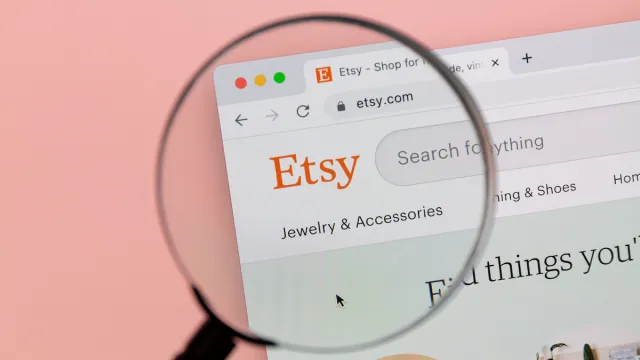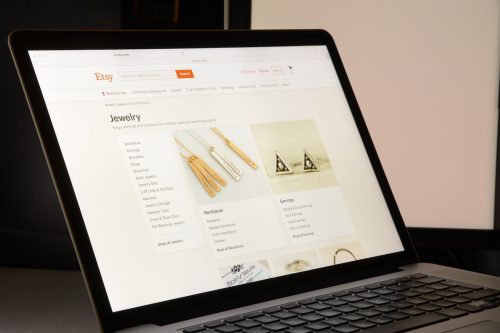Is Etsy Legit? Things to Know Before You Buy

If you like shopping online, then you’ve almost definitely heard of Etsy. The retailer sells a range of items, from handmade crafts to vintage furniture to downloadable games in PDF format. As you browse, you may have wondered: Is Etsy legit? Read on to see what shopping experts have to say, as well as what the site is best for and the obvious online scams you should avoid to have a seamless experience.
RELATED: Is Temu Legit? Things to Know Before You Shop.
What Is Etsy?
Etsy is an online marketplace that was founded in 2005 by Rob Kalin, Chris Maguire, and Haim Schoppik. Josh Silverman, the former CEO of Skype and shopping.com, is the current CEO. The company is owned by Etsy, Inc, and is worth about $8.5 billion.
The platform allows people and small businesses to buy and sell unique items, typically ones that are handmade.
“That could be literal products or original patterns for crafts or even repurposed images from things like old postcards,” says Julie Ramhold, a consumer analyst with the shopping comparison site DealNews.com.
You can currently shop from Etsy in more than 40 countries, including the U.S., Canada, the U.K., and Australia, according to its website. However, Etsy’s core audience is in the U.S., followed by the UK, Germany, and Canada.
Why Has Etsy Become So Popular?
Etsy serves as a bit of a foil to e-commerce players like Amazon and Temu. “While there are some indie businesses on Amazon, it’s mostly made up of third parties reselling common items,” says Ramhold.
“You can find unique and original pieces on Etsy, while Amazon tends to be items that are more mass-produced—even from sellers that may have original designs as they could be transferring those designs to things like T-shirts via another company rather than literally making the products themselves,” she explains.
So, if you want one-of-a-kind finds that your best friend and neighbor won’t have after plunking some search terms into Google, then Etsy is for you. You can also browse the Etsy platform to find or commission pieces with sentimental meaning. For example, you could buy a personalized bracelet with a custom inscription or order a watercolor photo of your house based on a photograph.
The site is also popular for supporting small businesses and sellers. In 2021, 5.3 million creatives sold on the site, nearly a million more than the number who sold there in 2020. Almost 80 percent of those sellers identify as women, 84 percent are businesses of one, and 95 percent operate from their homes, according to an Etsy report.
While a reseller on Amazon might never personally register your order, a knitter on Etsy is more likely to be grateful to share their art with the world.
RELATED: Is AliExpress Legit? What to Know Before You Shop.
How to Tell If an Etsy Seller Is Legit

Because it’d be impossible for such a large marketplace to regulate every seller that comes aboard, you want to do your own due diligence to ensure your Etsy seller is safe to buy from. Here’s what to look for to determine if a seller is legit.
- Store profile: Make sure the Etsy seller’s bio, number of sales, and number of admirers (available to view on the left side of the profile page) make sense. “It’s important to check the ratio of sales to admirers for a shop to see if something looks a bit off,” says Ramhold. “If you were to see a ton of admirers on a shop and very few sales, especially on items that aren’t super expensive, you might want to do a little digging before you buy.”
- Customer reviews: Customer reviews can tell you a lot about a shop. “Buyers will generally note if they had issues with something or if they were very impressed with the whole experience,” says Ramhold. “Reviews that include pictures of the items actually purchased are a bonus so that you can compare to the store listing.”
- Product images: Make sure these look like the item that’s being described in the listing. Then, reverse Google image search to see if the photos show up under other artists or sellers. “This could be an indication they’ve stolen the images for a scammy shop,” says Ramhold.
- Delivery rates and shipping time: You’ll want to know how long your item will take to ship and how much it’ll cost; you can learn this from the fine print and, sometimes, reviews. “When you visit a shop page, you can often see callouts at the top for certain things based on reviews from buyers,” says Ramhold. “For instance, one of my favorite Etsy shops has a history of ‘smooth shipping.'” If a shop doesn’t, you’ll want to investigate why, especially if the items aren’t made-to-order.
- Response time: A seller’s profile will tell you if they’re known for speedy replies. That indicates the seller is active, watching the page, and cares about providing a positive experience for its buyers.
- Comments on other social media platforms: Finally, take your search off Etsy to verify a seller’s account. “Look for shop announcements and see if you can find the seller on other platforms like Instagram,” says Ramhold. If they don’t seem to exist in the real world, their shop may be a scam.
- Enlist help from a friend: If you’re still unsure, Ramhold suggests asking a friend to help vet a seller. “If you know someone who shops on Etsy, ask them for recommendations for a particular item you’re looking for, or if you’re unsure about whether a seller seems legit, see if they can alleviate your worries,” she says. “If they agree that something seems sketchy, they can also help you to find another seller to help you buy what you need and lessen the chances of falling victim to a scam.”
RELATED: Is Vestiaire Collective Legit? What You Need to Know Before You Buy.
Etsy Scams to Look Out For

Sending Fake or Counterfeit Products
Let’s say you order a vintage mid-century modern dresser but wind up with something that looks like it was slapped together for $20—or it’s just an obvious fake. “If a shop is trying to scam buyers, it may ship the wrong items entirely because the sole purpose is to steal a shopper’s payment info and other details,” says Ramhold.
How to identify this scam: This one’s easy: “If reviews are stating they received the wrong item and it wasn’t remedied, skip the shop and look elsewhere,” Ramhold explains. Also, if a deal looks too good to be true, it just might be.
Sending Your Order to the Wrong Address
Here, Etsy scammers will ship an item to the wrong address so it’s marked as delivered. This makes it harder, and sometimes even impossible, for you to get a refund on the piece.
How to identify this scam: Again, you’ll need to look at the reviews. “They should be available, as reviews aren’t supposed to be removed unless they violate Etsy’s policies.” Also, check your details in your confirmation email. If the shipping address is incorrect, contact the seller or Etsy immediately.
Requesting Etsy Payments Off Platform
Etsy can process payment through the site, so be wary of anyone asking you to use an app like Venmo or Zelle. “They could also request gift cards or wire transfers as payment instead, but you should never use these methods for an Etsy order,” says Ramhold. “All of them are harder to reverse, so you won’t receive your order, and you’ll end up having to fight harder for a refund.”
How to identify this scam: Avoid the trap in the first place. “If a seller asks you to do something like this, skip it and shop elsewhere,” suggests Ramhold.
Same Item Listed for Different Prices
Sometimes, you’ll see the same item listed by two different Etsy sellers for different prices. With this scam, you’re not getting a handmade, unique item and may even be getting something resold from Amazon. The seller may even haggle with you to try and make you pay the higher price.
How to identify this scam: Do a reverse image search to see if you can find the product you’re shopping for elsewhere.
Sending You A Different Product Altogether
For example, you order a handmade lamp and get a lightbulb or an item from a big-box retailer that looks somewhat similar but isn’t.
How to identify this scam: Read the reviews. If a seller has a history of doing this, they’ll likely do it again.
Entirely Fake Etsy Shops
In this case, an Etsy scammer will direct you to a fraudulent website that looks like Etsy but isn’t, causing you to click a malicious link or engage in some other type of scam.
How to identify this scam: Make sure you’re always on the legitmate Etsy website; all Etsy URLs will start with etsy.com or help.etsy.com, while fake Etsy shops won’t.
Malware Scams
Many sellers on Etsy have reported receiving suspicious messages from “prospective buyers” that include malicious links that can compromise your personal data and potentially damage your device.
How to identify this scam: Pay attention before clicking any suspicious links, and never respond to messages that do not come through the Etsy inbox.
RELATED: Is Cider Legit? Everything to Know About the Fashion App.
What Happens If I Do Get Scammed on Etsy?

- Contact the seller immediately: As soon as you realize the item you’ve received is not what you ordered, or enough time has elapsed that you don’t believe your order is coming, contact the seller and ask for a refund.
- File a ticket with Etsy support: If the seller is unhelpful, you’ll need to take the issue up with Etsy. Go to the Etsy Help Center and file a support ticket. They’ll contact you with next steps.
- Contact your bank: If you used a credit card, you can dispute the charge with your credit card company. If you suspect your personal information may have been compromised, your bank can help you take the proper steps to ensure your online accounts remain secure.
- Report the incident to the Federal Trade Commission (FTC): Head to the FTC website to report the incident and potentially prevent others from falling for the same scam.
- Change your Etsy password: If your Etsy account is compromised, you’ll want to prevent the scammer from future log-ins. If your Etsy password is the same as any of your other accounts, like a bank or email account, you’ll want to change the password there, too.
- Keep an eye on your bank statements: Make sure no suspicious activity takes place after the scam.
How to Protect Yourself in the Future
- Protect your password: Use a unique, difficult-to-guess password for each of your accounts, including your Etsy account.
- Research the seller extensively: You’ll want to read their reviews and locate them on social media outside of the Etsy platform.
- Use a VPN when using the platform: A virtual private network prevents hackers from being able to intercept your connection on public Wi-Fi.
- Do a reverse image search before you buy: You’ll be able to see if the product is associated with any other shops or sellers or if it’s truly authentic and unique.
- Avoid clicking on suspicious links: Whether they come via email or the Etsy inbox, don’t click suspicious links as they could be infected with malware.
- Block and report spammy messages: All legit messages from Etsy will be marked “From Etsy” in the Etsy inbox. If you receive a suspicious message, block it and report it to Etsy.
- Enable multi-factor authentication: You can also go to the Security section under your Account settings and turn on two-factor authentication.
- Use antivirus software: Most computers have it automatically built in, but you can also find a downloadable one.
Conclusion
Before purchasing from Etsy, be sure to research the seller and read the product reviews. It would help if you also made yourself aware of common Etsy scams so you can take steps to avoid them. For more retail and shopping advice, be sure to visit Best Life again soon.